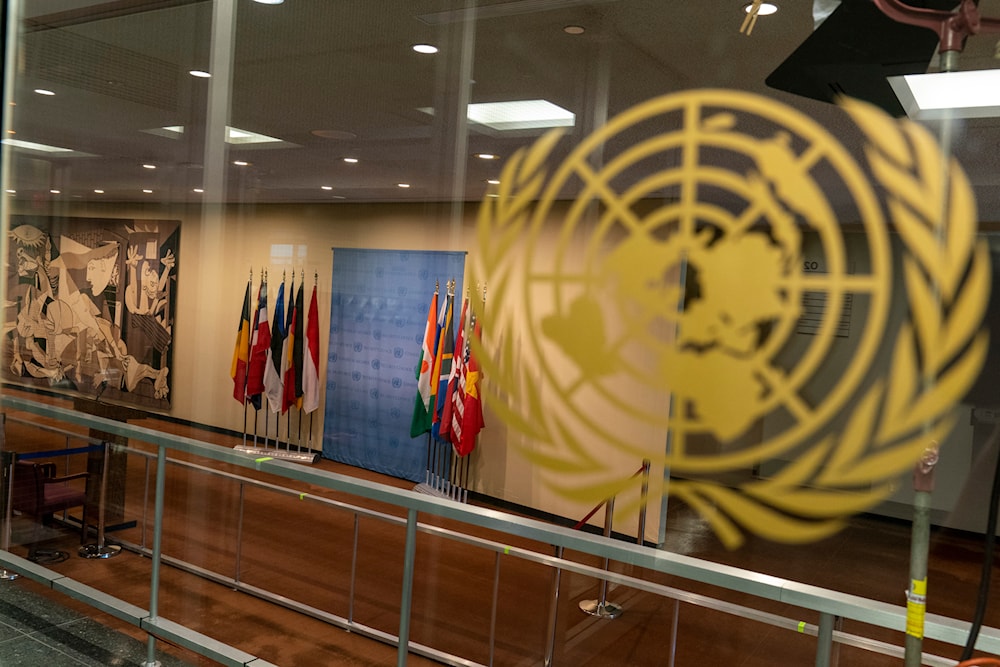UN experts warn weapons transfer to 'Israel' 'likely' in breach of IHL
The experts explain how providing weapons to the Israeli occupation can breach the 1949 Geneva Conventions and the 1948 Genocide Convention.
-

The Security Council area is closed off to members of the media during the 75th session of the United Nations General Assembly, Wednesday, Sept. 23, 2020, at UN headquarters. (AP)
UN experts warned today that any act of transferring weapons or ammunition to "Israel" that are to be used in Gaza is likely in violation of international humanitarian law and must stop immediately.
“All states must ‘ensure respect’ for international humanitarian law by parties to an armed conflict, as required by 1949 Geneva conventions and customary international law,” the experts emphasized.
“States must accordingly refrain from transferring any weapon or ammunition – or parts for them – if it is expected, given the facts or past patterns of behavior, that they would be used to violate international law,” they added.
The experts restressed that “such transfers are prohibited even if the exporting state does not intend the arms to be used in violation of the law – or does not know with certainty that they would be used in such a way – as long as there is a clear risk."
Any transfer of weapons or ammunition to #Israel that would be used in #Gaza is likely to violate international humanitarian law and must cease immediately, human rights experts warned today.
— United Nations Geneva (@UNGeneva) February 23, 2024
“All States must not be complicit in international crimes through arms transfers." pic.twitter.com/441esMBMbW
It is not only limited to International Humanitarian Law
The experts emphasized that all countries who ratified the Arms Trade Treaty have much bigger responsibilities to refuse arms exports to the occupation if they “know” that the arms “would” be used to commit international crimes, or if there is an “overriding risk” that the arms transferred “could” be used to commit serious violations of international humanitarian law.
“The need for an arms embargo on Israel is heightened by the International Court of Justice’s ruling on 26 January 2024 that there is a plausible risk of genocide in Gaza and the continuing serious harm to civilians since then,” the UN experts said.
The Genocide Convention of 1948 requires countries part of the convention to use all means reasonably possible to prevent genocide in another state as much as they could. “This necessitates halting arms exports in the present circumstances,” the experts stressed.
The UN experts saluted the halting of arms transfers to "Israel" by Belgium, Italy, Spain, the Netherlands, and the Japanese company Itochu Corporation.
“State officials involved in arms exports may be individually criminally liable for aiding and abetting any war crimes, crimes against humanity or acts of genocide,” the experts stated, adding, “All States under the principle of universal jurisdiction, and the international criminal court, may be able to investigate and prosecute such crimes."
Read more: Spain's lies about ending arms to 'Israel' exposed; data speak volumes
Will the UK follow suit?
Diplomatic pressure on the UK government is driving the latter to follow in the footsteps of other countries and ponder suspending arms export licenses to "Israel" if Benjamin Netanyahu proceeds with the ground invasion of Rafah in southern Gaza.
Even though a decision to suspend arms export licenses to the Israeli occupation has not been taken so far, ministerial sources revealed that if ministers receive a legal opinion labeling "Israel" in breach of international humanitarian law, the arms suspension decision could be swiftly taken.
At a meeting in Geneva on February 21 on the Arms Trade Treaty, Palestinian diplomats stated that UK officials have breached the treaty by refusing to revoke arms sales after the International Court of Justice ruled that "Israel" must ensure its forces did not commit acts of genocide against Palestinians in Gaza.
This is prompted by Article 6 in the treaty, which directly prohibits states from authorizing any transfer of conventional weapons if they are aware that these weapons will be used in the commission of genocide, crimes against humanity, and certain war crimes.

 4 Min Read
4 Min Read










